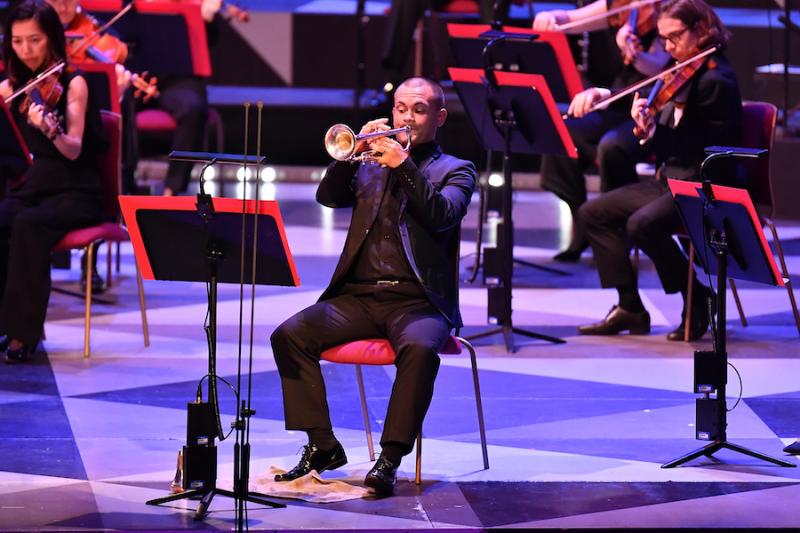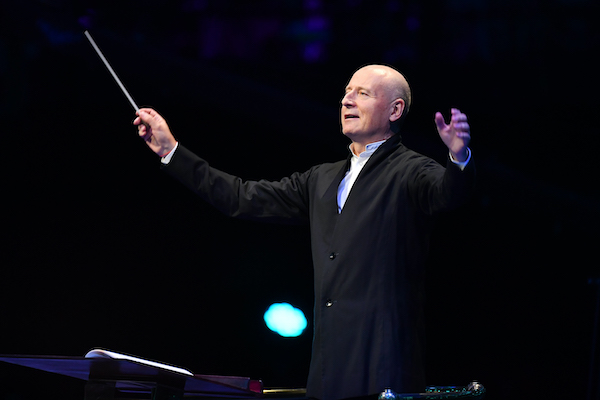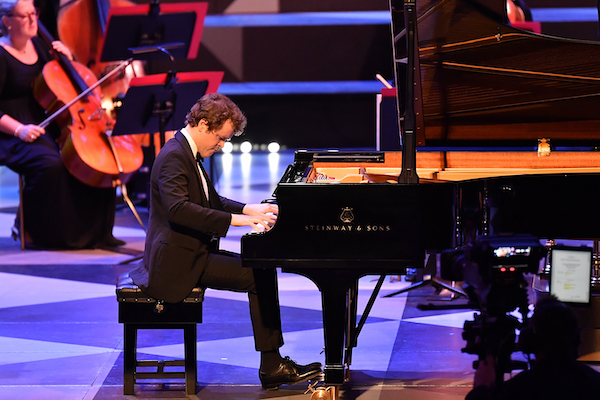BBC Proms live online: Grosvenor, Evans, Philharmonia, Järvi review – energy and sparkle | reviews, news & interviews
BBC Proms live online: Grosvenor, Evans, Philharmonia, Järvi review – energy and sparkle
BBC Proms live online: Grosvenor, Evans, Philharmonia, Järvi review – energy and sparkle
Another irresistible concert in this strong Proms season

Unlike the other two Proms I’ve reviewed this season, last night’s by the Philharmonia did not have any bells and whistles when it came to the staging, nor did it explore the edges of the repertoire.
The originally-billed Esa-Pekka Salonen withdrew from the concert and his late replacement was Paavo Järvi (pictured below). He clearly enjoyed himself, conducting with a wry smile through Ravel’s Le Tombeau de Couperin and enjoying the right/wrong notes of Shostakovich’s First Piano Concerto.
Ravel's suite was written during World War I in tribute to deceased friends. But I can never hear it as tragic: rather the Baroque-tinged dances seem to celebrate life and movement. The focus of the orchestration is the oboe, with solos in each of the movement. Tom Blomfield was brilliant, fluid in the intricacies of the “Prelude”, spry in the dotted rhythms of the “Forlane” and languid in the middle section of the “Rigaudon”.  The tempos were fast – requiring some fleet horn playing by Diego Incertis Sánchez – but with a pleasing give at the ends of the lines in the “Menuet”. Ravel conjures untold colours from his chamber orchestra, but the bite of the woodwind playing was the lasting impression.
The tempos were fast – requiring some fleet horn playing by Diego Incertis Sánchez – but with a pleasing give at the ends of the lines in the “Menuet”. Ravel conjures untold colours from his chamber orchestra, but the bite of the woodwind playing was the lasting impression.
There is also bite in Shostakovich’s concerto, which reduces the orchestra to strings alone, but adds a solo trumpet, acting as an alternative pole to the piano, a pithy commentator often bringing things back down earth. Jason Evans, the principal trumpet of the Philharmonia, was making his first appearance as soloist with them. He was suitably brittle in the outer movements, but found a wistful tone in the slow movement, muted, bluesy, and more than a bit Hollywood.
Benjamin Grosvenor (pictured below) flew through the difficulties of the fast music. He has a high, active finger action and bold sound, relishing the restless, almost manic good humour of the first movement. In the slow movement he focused on the counterpoint between the hands, sometimes, I felt, at the expense of the right hand’s cantabile line.  The last movement is an energetic gallop encompassing a drunken folksong on the trumpet and a muscular piano cadenza – Grosvenor was driven – before the trumpet ends things with a staccato tattoo. It’s an ending that demands audience applause and its lack was like a delivering a punchline to silence.
The last movement is an energetic gallop encompassing a drunken folksong on the trumpet and a muscular piano cadenza – Grosvenor was driven – before the trumpet ends things with a staccato tattoo. It’s an ending that demands audience applause and its lack was like a delivering a punchline to silence.
It took a while for me to warm to Järvi’s take on Mozart’s "Jupiter" Sympony (No.41). I found the fluctuating tempo at the opening a bit mannered and it all felt a bit purposeless after the propulsion of the earlier pieces. The transition into the development section was virtually leaning backwards. But things got better.
The second movement had a delightful chamber feel to it, with the musicians listening to each other as much as watching Järvi. Viewing at home I was disturbed by a very loud helicopter overhead, which I was cursing before realising I could just pause the livestream and resume when it was gone. Not a luxury enjoyed during “in the flesh” concerts!
The Menuetto allegretto danced, Järvi conducting with a broad smile and big round gestures that gave the music a rolling gait. The final movement is the crowning glory of this symphony, and a suitable finale to Mozart’s symphonic output. Here the natural trumpets soared, the period timps had edge – but I felt sorry, here and throughout, for the bassoonists, who seemed a bit meanly treated by the sound mixer. The climax, when the five themes are combined in triumphant counterpoint, is irresistible – but it always gives me pause to think that Mozart probably never heard it. Everyone deserves to hear it.
- Watch the livestream of this concert on BBC iPlayer or listen on BBC Radio 3 for the next month
rating
Share this article
The future of Arts Journalism
You can stop theartsdesk.com closing!
We urgently need financing to survive. Our fundraising drive has thus far raised £33,000 but we need to reach £100,000 or we will be forced to close. Please contribute here: https://gofund.me/c3f6033d
And if you can forward this information to anyone who might assist, we’d be grateful.

Subscribe to theartsdesk.com
Thank you for continuing to read our work on theartsdesk.com. For unlimited access to every article in its entirety, including our archive of more than 15,000 pieces, we're asking for £5 per month or £40 per year. We feel it's a very good deal, and hope you do too.
To take a subscription now simply click here.
And if you're looking for that extra gift for a friend or family member, why not treat them to a theartsdesk.com gift subscription?
more Classical music
 Levit, Sternath, Wigmore Hall review - pushing the boundaries in Prokofiev and Shostakovich
Master pianist shines the spotlight on star protégé in another unique programme
Levit, Sternath, Wigmore Hall review - pushing the boundaries in Prokofiev and Shostakovich
Master pianist shines the spotlight on star protégé in another unique programme
 Classical CDs: Big bands, beasts and birdcalls
Italian songs, Viennese chamber music and an enterprising guitar quartet
Classical CDs: Big bands, beasts and birdcalls
Italian songs, Viennese chamber music and an enterprising guitar quartet
 Connolly, BBC Philharmonic, Paterson, Bridgewater Hall, Manchester review - a journey through French splendours
Magic in lesser-known works of Duruflé and Chausson
Connolly, BBC Philharmonic, Paterson, Bridgewater Hall, Manchester review - a journey through French splendours
Magic in lesser-known works of Duruflé and Chausson
 Biss, National Symphony Orchestra, Kuokman, NCH Dublin review - full house goes wild for vivid epics
Passionate and precise playing of Brahms and Berlioz under a dancing master
Biss, National Symphony Orchestra, Kuokman, NCH Dublin review - full house goes wild for vivid epics
Passionate and precise playing of Brahms and Berlioz under a dancing master
 Verdi Requiem, Philharmonia, Muti, RFH review - new sparks from an old flame
Discoveries on a veteran maestro's epic journey
Verdi Requiem, Philharmonia, Muti, RFH review - new sparks from an old flame
Discoveries on a veteran maestro's epic journey
 Batsashvili, Hallé, Wong, Bridgewater Hall, Manchester review - a star in the piano universe
The Georgian pianist brings precision and freedom to Liszt’s warhorses
Batsashvili, Hallé, Wong, Bridgewater Hall, Manchester review - a star in the piano universe
The Georgian pianist brings precision and freedom to Liszt’s warhorses
 Naumov, SCO, Egarr, Queen's Hall, Edinburgh review - orchestral magic rescues some punishing music
Hard-driven Beethoven, monotonous Eötvös, some light from Kernis
Naumov, SCO, Egarr, Queen's Hall, Edinburgh review - orchestral magic rescues some punishing music
Hard-driven Beethoven, monotonous Eötvös, some light from Kernis
 Classical CDs: Shipping lines, sabre dances and sea lice
Neglected piano concertos, Italian art songs and new music for trombones
Classical CDs: Shipping lines, sabre dances and sea lice
Neglected piano concertos, Italian art songs and new music for trombones
 Il trionfo del Tempo e del Disinganno, Irish Baroque Orchestra, Whelan, St George’s Hanover Square review - Handel’s journey of a soul
Pleasure gets the best deal despite Beauty’s struggle to higher things
Il trionfo del Tempo e del Disinganno, Irish Baroque Orchestra, Whelan, St George’s Hanover Square review - Handel’s journey of a soul
Pleasure gets the best deal despite Beauty’s struggle to higher things
 Uproar, Rafferty, Royal Welsh College, Cardiff review - colourful new inventions inspired by Ligeti
Unfussy professionalism from Wales-based new music ensemble
Uproar, Rafferty, Royal Welsh College, Cardiff review - colourful new inventions inspired by Ligeti
Unfussy professionalism from Wales-based new music ensemble
 Attacca Quartet, Kings Place review - bridging the centuries in sound
Grammy-winning quartet bring more American punch than Gallic je-ne-sais-quoi to Ravel
Attacca Quartet, Kings Place review - bridging the centuries in sound
Grammy-winning quartet bring more American punch than Gallic je-ne-sais-quoi to Ravel

Add comment